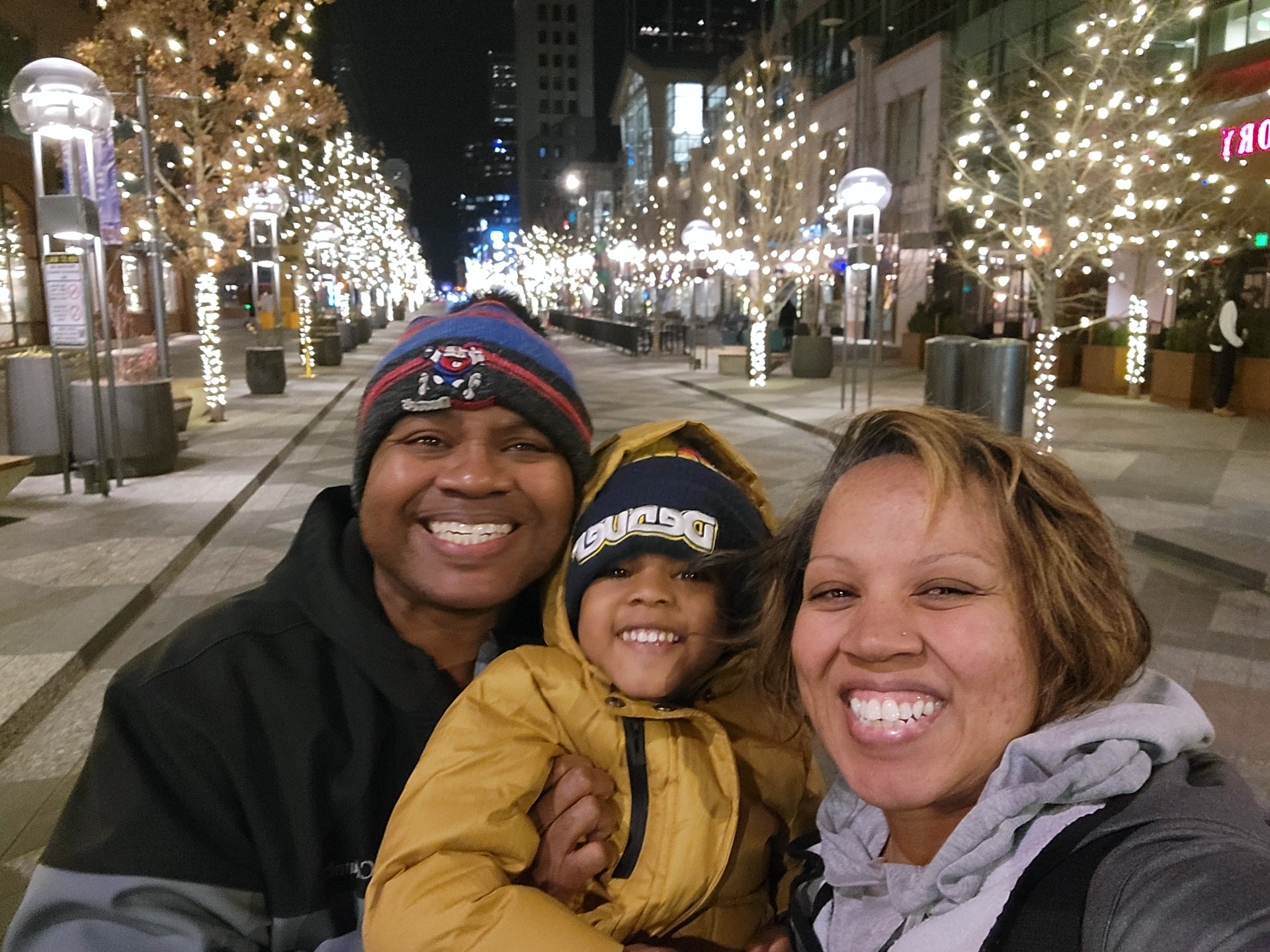Whether you’re a die-hard Christmas fan or someone who just wants to get it over with, the holidays are full of stress-inducing moments. We tend to forget that the holidays are on the same day every year, and we allow ourselves to get crushed both emotionally and financially. Instead of being a season of rest and celebration, the holidays are often stressful—and even painful. Even when we plan ahead, holiday stress can sneak up on us without a moment’s notice (just like last night’s chili).
And with new travel regulations thanks to the global pandemic, extra financial strain, a heated election, and the general dumpster-fire chaos of 2020, we’re all feeling a little more raw and exposed than in “normal” holiday seasons. I don’t know about you, but I’m kind of hoping Clark Griswold will show up to bring some order to a season already out of control.
What Is Holiday Stress?
Holiday stress (or any kind of stress for that matter) is our mind and body’s response to the pressing responsibilities and demands of our lives. Stress is normal. When we experience a threat—whether it’s holiday traffic, passive-aggressive family members, or a family fight over Christmas dinner—our brain floods our bodies with stress hormones like cortisol and adrenaline. Our bodies prepare to take action. Our heart rate spikes. Our pupils dilate. Our muscles tighten.
Anxiety is real, but it doesn’t define you. Get your life back with our new quick read!
In the short term, stress can be helpful. It keeps us focused and alert. But living in a chronic state of stress causes horrific damage to our mental and physical health. It’s like slamming your foot on the gas and the brakes at the same time. Eventually, the car engine melts, the brakes fail, and we run the car into the ground.
The holidays should be wonderful, but they’re often demanding. And in light of all the extra shopping lists, the travel plans, the awkward family conversations, and the millions of little expectations we place on ourselves, this season will require that we give ourselves and others some grace—a lot of it.
Stressful events will happen, make no mistake, but here’s the exciting thing: We get to choose how we respond to those events.
And let’s be honest: 2020 was filled with financial challenges, travel restrictions, health concerns, and political nonsense, among other things. This makes Christmas 2020 the perfect time for a holiday season reset. Holidays shouldn’t be stressful and so filled with drama. By taking back control of your attitude, your approach to conflict, and your actions, you can cut holiday stress in purposeful and dramatic ways!
13 Ways to Reduce Holiday Stress
A few years ago, Healthline did a survey that found that 62% of people said their stress level increases during the holiday season.1 And that was before the chaos of 2020! Imagine that number after experiencing job losses, health crises, a global pandemic, an election and canceled . . . everything.
The American Psychological Association has shone a light on America’s mental health in their latest Stress in America survey. They found that 78% of Americans are stressed out about the coronavirus.2 They also found that one in five adults are worse off mentally now than they were this time last year.3 Makes sense, right?
This year, let’s put in some extra effort to get our minds and hearts in a good place before we head to Mom and Dad’s house for Christmas dinner. Refusing to let stress run your life is a daily choice.
To help you along your journey, I want to share 13 ways you can reduce the holiday stress (before it comes) so you can spend your time on what really matters to you.
1. Set boundaries for your schedule and spending.
Over the holidays, you get to decide where you go, how long you stay there, who you invite into your home, and how much money you’ll spend. It might feel like your mom, your father-in-law or your second cousin will be calling the shots.
Wrong. You choose.
It’s so important to set boundaries before you’re knee-deep in Christmas festivities. The last thing you want is to find yourself talking politics with an idiotic second cousin or making your fifth gingerbread house for the church bake sale and using resentment as frosting. Let me repeat myself: Choose to set your boundaries now! Decide what’s important to you and protect it with everything you’ve got.
Before you commit to travel or hosting plans, decide what your limit is. Is it three days? What about two weeks? If you’re married, talk to your spouse and create a plan that works for both of you.
By the way . . . don’t drive or fly thousands of miles to a place that’s inhospitable and threatening. You can say no. Just don’t go. But once you decide and commit to seeing family, you must do it with a good attitude. It’s called acting like a grown-up.
2. Avoid family conflict.
Holidays expose our need for boundaries with our families. Even the best families can drive you crazy.
So this year, before you even pack your bags, spend some time thinking about the potential conflicts that will pop up with family. If your Uncle Eddy has a pattern of talking bad about a particular group of people, don’t be surprised when he begins one of his rants. You can’t change him—but you do get to decide how you respond. You can ask him to stop, or you can get up and leave. Settle in your heart and your mind what you will and won’t tolerate.
This year, people will be talking about politics, COVID, the economy, race relations, etc. Decide who and what you want to discuss before you’re stuffing your face with mashed potatoes at the dinner table. Believe it or not, it can be done. You don’t have to subject yourself or your family to a heated argument you don’t want to be in—boundaries, remember?
Create a plan of action and send an email ahead of time to make it clear that you don’t want to talk about politics or your little brother’s addiction. And if someone violates that boundary while you’re there, you get to walk out. Pay attention to when you feel uncomfortable, awkward, unsafe, embarrassed or trapped. If someone is drunk or angry or using foul language, you get to decide to walk away.
3. Focus on what you can control.
There are only two things on planet Earth you can control: your thoughts and your actions. That’s it. You can’t control what your parents say around the dinner table. You can’t control your kids’ attitudes. And when you choose to let go of what you can’t control, you’ll automatically reduce the amount of stress in your life by refusing to carry other people’s problems.
In seasons of stress in my life, the first thing I do every morning is make a list of what I’m stressed about. Then I write down the things that are in my control. Everything else gets tossed in the trash. Take control and ownership of your thoughts and actions and do what’s best for you and your family.
4. Know your role in the situation.
Sometimes we experience stress by taking on roles we were never meant to shoulder. For example, if you’re going to your girlfriend’s house for Christmas and you have to sleep on the uncomfortable couch and eat their weird food, remember that you’re not the star of the show. It’s not your house. Keep your mouth shut and know that your role is to support your girlfriend. Not only will you score major brownie points with your girl, but you’ll also score points with the parents.
If you travel to your in-laws’ home but they don’t really like you, choose before you arrive to not absorb the passive-aggression, their opinions on your parenting, or their decision to make meals with extra gluten. Choose to be kind. Choose to let dumb criticism roll off your shoulders. Choose to heap coals of kindness.
And if you’re the one inviting your significant other to family dinner, be a gracious host or hostess. Remember that your guest is missing out on their traditions. Ask them what they normally do and recognize they might be a little sad to miss out on time with their family.
5. Say no.
I love Christmas as much as the next person, but no matter who you are, it’s absurd to try to attend a million white elephant parties, ornament exchanges, and cookie decorating parties. Especially during COVID.
Listen: You can’t be everywhere at once. Be really honest with yourself about what you can handle, and speak up if it’s too much. Instead of going to five Christmas parties, pick one or two. Prioritize your family’s time and only commit to what you want to do. It’s all about quality, not quantity.
6. Limit your time on social media.
There’s an overwhelming amount of information, nonsense and news in our country right now. Not only do we see it on our TVs, but now we’re seeing it through our social media feeds. It’s literally making us insane.
If you hear anything from me, hear this: Stay off social media if you’re stressed. Those perfect Instagram and Pinterest feeds won’t do anything but cause you to compare your holiday plans to your weird co-worker’s (who you don’t really even like anyway). Social media pictures are generally lies. Fantasy. They’re not real. They don’t show the burned turkeys, the family fights, and the mounting piles of credit card debt.
This Christmas, spend more time looking into your loved one’s eyes than staring at your screens. Hold hands, not video game controllers. Throw a football or kick a soccer ball—in real life. I hope you choose human connection, joy and laughter over thumbs-ups and retweets. Each one of your electronic devices comes with an off button. Use it.
7. Picture the Christmas you want to have.
As I said above, this is the perfect year for a holiday reset.
Set expectations for yourself and others by painting a picture of what you want your Christmas to look like. Who is sitting around the table at mealtime? What are you all eating? Talking about? Are you laughing with your kids as you make Santa-shaped pancakes? Or are you holding hands with your spouse in front of the fire? Maybe you dusted off the old vinyl Christmas album and you’re jamming away.
Whatever it is, keep that picture at the front of your mind. Share your picture with your loved ones so they can understand where you’re coming from. Ask them to paint a picture of what they want, too, so you can choose to honor them.
And if something comes up that threatens to take the place of what’s truly important to you and your family, give yourselves permission to say no. Let your calendar and your to-do list reflect the Christmas you actually want to have this year.
8. Make a Christmas budget.
Do it. Right now.
A budget is creating boundaries for your wallet (or bank account). And budgeting helps reduce stress because it gives you a plan for your money. Make a zero-based budget every month before the month begins.
Remember, you get to control your thoughts and actions—including your spending. You get to decide where every single dollar in your bank account goes. Budgeting for Christmas will help you avoid the impulse purchases or spending too much on those white elephant gifts. There’s nothing worse than waking up the day after Christmas broke with no idea where your paycheck went. So make a budget and stick to it. You’ll be glad you did.
9. Don’t overdo it on the sugar.
You really can have too much of a good thing. And when it comes to the holidays, that often looks like late nights of hot chocolate and Mom’s famous sugar cookies. But too much sugar messes up your natural hormone responses, your blood sugar and insulin levels, and your brain’s neurotransmitters (the body’s chemical messengers).
Mix that with a lack of sleep (from all that caffeine) and a packed schedule, and you’ve got the perfect storm for a rush of anxiety. Limit how much sugar you eat and feed your body with nutritious food as much as possible.
Get outside and move. I don’t care how cold it is—put on some extra layers and just do it (or at least get into the gym as often as possible). Nature is important for our emotional and physical health. And exercising gives your body a way to process and release stress hormones. Bundle up and go on your own Christmas lights walking tour or get an epic snowball fight going in your neighborhood. Don’t forget that play is exercise too. Even in the small things, you can prioritize movement. Anything is better than nothing!
10. Get plenty of sleep and stay healthy.
Anxiety affects at least 40 million people in the U.S.4 And one of the most powerful tools you have to reduce anxiety is sleep. When you’re not sleeping, your brain’s emotional centers become overactive, which increases anxiety levels. So instead of staying up late for the third night in a row to binge those Hallmark movies, prioritize your sleep. Not only will it keep your stress and anxiety at bay, but it will also help your immune system stay healthy.
Being sick at Christmastime is the absolute worst, so you need to do what you can to avoid it! As you all know, washing your hands and doing immune boosting activities (exercising, getting outside, and resting) will help you feel strong, peaceful, and healthy. Don’t burn the candle at both ends by staying up late and getting up early. Get enough sleep. I can’t stress this enough.
11. Protect your downtime.
This is a season of giving, but don’t give so much of yourself away that you have nothing left to give. Keep your peace and quiet, and you’ll keep your sanity. Make time to enjoy the things you love. Read a book. Do a Christmas devotional. Or dive into some of your favorite Christmas movies that put you in the holiday spirit.
To keep your joy intact, create some breathing room between parties, travel schedules, deadlines at work and shopping trips.
Try to stick to your normal routine. If your average day starts with waking up, pouring yourself a cup of coffee, and reading the newspaper, don’t skip that. Having some normalcy can help keep you calm and focused on the day ahead. Plus, it’s a great way to stay sane—especially when you have a houseful of extended family (and in-laws).
12. Dealing with canceled plans.
2020 has been the year of canceled plans. We all know what it’s like to deal with the disappointment of canceled plans. We’ve had canceled vacations, canceled family gatherings and birthday parties, canceled paychecks and even canceled church.
As we get into the holiday season, you might be facing more canceled plans. Maybe your annual Christmas at Grandma’s isn’t happening this year because you want to keep Grandma safe. Or maybe your kids and grandkids aren’t going to make the trip this year because they lost their jobs. Whatever you’re going through, it’s important to reset your expectations. Give your family and friends grace (let them off the hook), because these circumstances aren’t “normal.”
Don’t put the guilt trip on them just because you can’t see your grandkids. You might have to let go of the picture-perfect Christmas you had in mind for this year . . . and create a new picture. Like I’ve already said, this is the year of the Christmas reset.
13. Make connection your number one priority.
I like to say that relationships are your emergency fund for life—so I invite you to think of this season as a chance to stockpile those funds. Make people your top priority. Christmastime is meant to be filled with joy and thankfulness and lingering conversations over the dinner table and lots of laughter. But connection doesn’t happen by accident: You must be intentional.
Don’t let the month go by in a total blur. Slow down and think about what you really want to do this season. Don’t get so caught up in the hustle and bustle that you forget to enjoy the people you’re doing all this for.
Good folks, make every effort to respond well to holiday stress this year. Yes, it’s super annoying when Great-Aunt Becky keeps pinching your kids’ cheeks—so honor her and protect your kids by being prepared with a polite request for her to stop. Stress is part of life, so let’s do our part to be gracious and generous with ourselves and the people we care about.
While stress is normal and even healthy for us, if we don’t listen and respond to it, our stress will quickly morph into anxiety. I’m super passionate about helping people be well, and as someone who is personally prone to anxiety, I’m excited to share my new Quick Read, Redefining Anxiety, with you. In this short book, I’ll break down the four biggest myths we believe about anxiety and give you some practical steps you can take to start getting your life back.
Dr. John Delony is a mental health expert with two PhDs in counselor education and supervision, and higher education administration from Texas Tech University. Before joining Ramsey Solutions in 2020, John worked as a senior leader, professor and researcher at multiple universities. He also spent two decades in crisis response, walking with people through severe trauma. Now as a Ramsey Personality, he teaches on relationships, mental health and wellness. Learn More.




